
Brief Biography
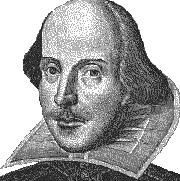
Introduction
Here is a short biography of William Shakespeare. For more detailed information see my list of recommended biographies .
Youth
William Shakespeare was born around 23rd April 1564 in Stratford-upon-Avon, Warwickshire in the English Midlands, the third child and eldest son of John and Mary Shakespeare. John was a glove-maker and prominent member of the community, becoming town bailiff (similar to Mayor), but also a brogger or illegal wool dealer. William was a member of a large family. I've produced a family tree which you may see here.
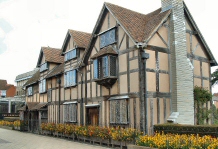
London
1580's
We don't know exactly when, but sometime in the late 1580's Shakespeare took lodgings in London where he became an actor.
The first unmistakable reference to him in London is in Robert Greene's Groatsworth of Wit of 1592. Greene was a playwright dying in poverty and bitterness when he wrote this pamphlet which was published after his death. In it he refers to
"an upstart crow, beautified with our feathers, that with his tiger's heart wrapped in a player's hide supposes he is as well able to bombast out a blank verse as the best of you; and being an absolute Johannes Factotum, is in his own conceit the only Shake-scene in a country."
In Shakespeare's Henry VI part 3 is the line "O tiger's heart wrapp'd in a woman's hide!" Greene, who had a Masters degree, appears to be attacking this upstart actor who was presuming to write plays, even though he hadn't been to university. So Shakespeare was an actor who had already had at least one play performed.
1593 - 1595
In 1593 the theatres in London were all closed by the authorities because of the plague, and William wrote the narrative poem Venus and Adonis. This became very popular, being reprinted sixteen times before 1640, and made Shakespeare famous. A year later his poem Rape of Lucrece was published. This was not so successful in the bookshops, but eight reprintings by 1640 didn't make it a flop!
In 1594, when the plague had abated, the acting company called the Lord Chamberlain's Men were formed. This was the company, later to become the King's Men for which Shakespeare would act and write for the rest of his career. He is recorded as one of the players paid for giving two performances for Queen Elizabeth I at Greenwich in 1595.
The Chamberlain's Men were ‘managed’ by James Burbage who had built two playhouses north of the city in Shoreditch called The Curtain and The Theatre. Burbage had two sons, Cuthbert and Richard. Cuthbert wasn't an actor but after his father's death became the company's business manager. Richard was to become the greatest actor of the age, playing all Shakespeare's leading roles as well as many other starring parts.
1596 - 1597
In the August of 1596 William and Anne's only son Hamnet died at only eleven and a half years old. This must have been devastating to them both. Is there a link with another recorded event of that year? William seems to be the initiator of the application for a coat of arms to be granted to John his father, marking him and his descendants as gentlemen rather than yeomen. An application by John twenty years earlier had come to nothing, but now it was successful.
1597 was a year when we can see William becoming richer, but no doubt fearing for the future. Early in the year James Burbage died, and his sons took over management of the two Shoreditch playhouses. Worryingly the lease on The Theatre expired in April and no new lease could be agreed with the landlord. The players moved into The Curtain next door, but one can guess that this was very much second best. The company's sponsor, Lord Hunsdon had died a year earlier, but after a delay, his son was appointed as Lord Chamberlain in his place and he appointed the Shakespeare/Burbage company as his players.
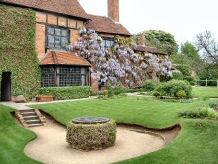
The Globe Years
As I describe in the Globe Playhouse page the company removed the timbers of The Theatre to a new site south of the Thames, and in 1599 the Globe was in business. Will was one of the five sharers who put up money for its building, and shared in its profits. Richard and Cuthbert Burbage owned half, and the remainder was shared between Shakespeare, John Hemmings, Henry Condell, William Sly and Augustine Philips.
The first recorded performance of a Shakespeare play at the Globe is Julius Caesar on 21st September 1599 when a traveller Thomas Platter saw the play. The new playhouse seems to have put new creative life into the playwright because As You Like It, Twelfth Night and Hamlet were probably produced there within the next year or so.
In March 1603 Queen Elizabeth died and James VI of Scotland, the son of Mary Queen of Scots became James I of England. Less than two months later Shakespeare's company were named as the King's Men by royal warrant. In the following years Shakespeare acted in Ben Jonson's Sejanus, no doubt among many other plays of his own and by others. He also wrote Othello, Macbeth, King Lear among others during these years.
He was still an active business man in Stratford too at this time.
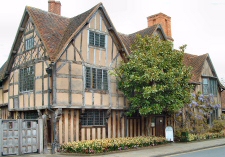
Around 1608 the King's Men had taken over control of the Blackfriars playhouse in the City of London. This was an indoor playhouse, targeted at the more affluent playgoer. It has been suggested that some of his later plays, Cymbeline and The Tempest for instance may have been written specifically for that indoor stage.
Retirement
At the end of The Tempest Shakespeare wrote a speech for Prospero that has been taken as Shakespeare's resignation from play-writing. He may have collaborated with Fletcher on a few more plays, but it does seem that by then he was spending more time in Stratford than in London. The burning down of the Globe in 1613 seems to have been the turning point when he decided never to write again, even though the playhouse was rebuilt within a year.
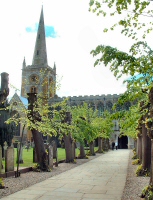
He died in Stratford at the age of 52 on 23rd April 1616. There is a story that he died after a night of carousing with the playwright Ben Jonson and the poet Michael Drayton who had come to Stratford to visit him.
He is buried in the parish church, Holy Trinity.
On the gravestone is the inscription:
"Good friend for Jesus sake forbear,
To dig the dust enclosed here:
Blest be the man that spares these stones
And curst be he that moves my bones"
Recommended Books
My list of recommended books about Shakespeare may be found in the Shakespeare section of the Well Furlong Book Shop. If you so wish, you may go on to buy many of the volumes in our Book Shop directly from Amazon.com or Amazon.co.uk.
Links
Internal
A brief history of the Bard's life.
Shakespeare was part of a large family in Stratford and fathered three children. Click here to see the family tree.
I have no problem reconciling the image of the man we know as Will Shakespeare, and the works that bear his name, but some people do, and the authorship debate continues. The movie Anonymous has opened up the argument to a wider audience.
A list of all the plays, including the doubtful ones, in probable order of first performance.
Drawings and information about the playhouse where Shakespeare's plays were produced in his lifetime, and information and pictures of the new reconstructed Shakespeare's Globe on London's Bankside
External
British Library Shakespeare Site
British library extensive site dedicated to Shakespeare. It is a rich source of digitised documents of the time, as well as analysis of the man and his works.
Shakespeare's Birthplace Trust's site.